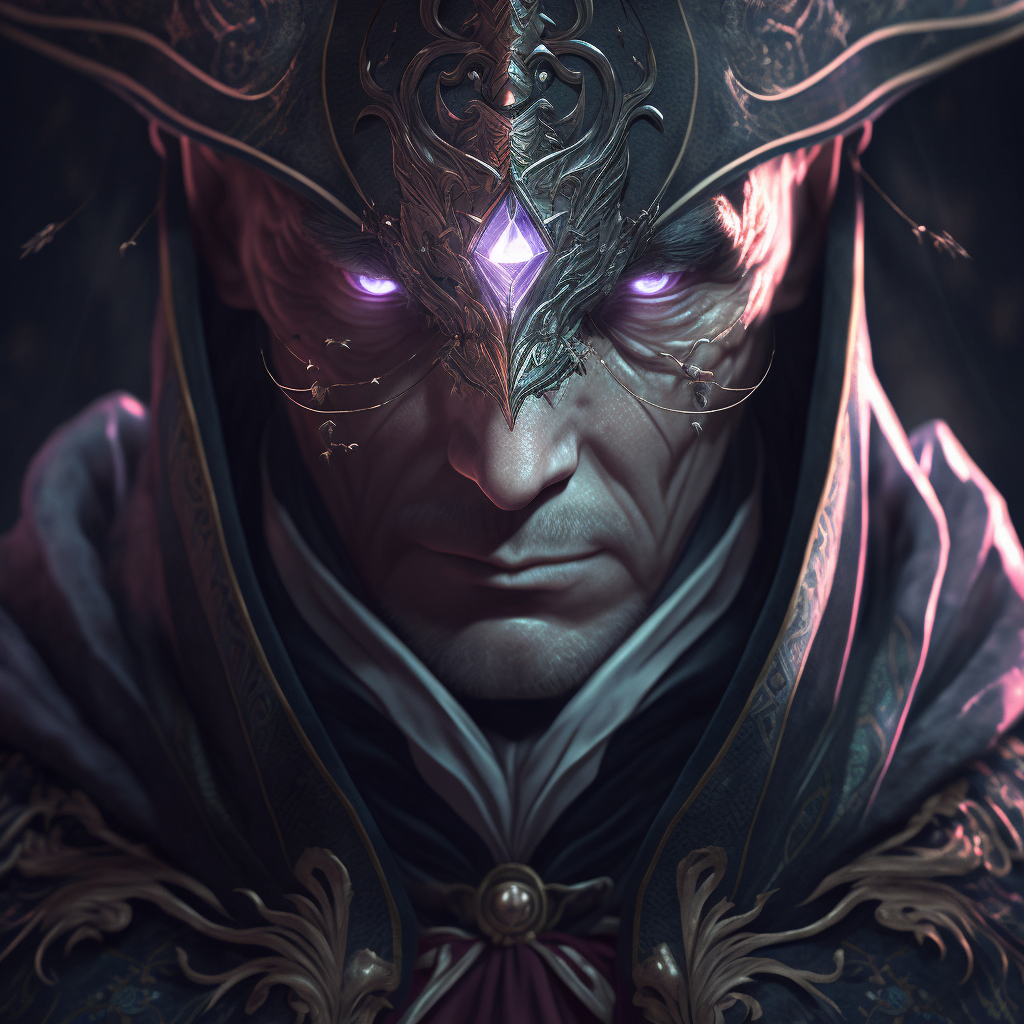Xin
Emperor Xin, an exile from the ancient nation of Azlant, was the visionary founder of Thassilon, an empire that would later be divided by the squabbling runelords that he created.
Mental characteristics
Personal history
Early life
Xin was born in the heyday of Azlant as the heir of an influential family. Trained as a wizard from a young age, Xin was a natural prodigy and often considered his lessons boring and stifling. He surmised that traditional Azlanti wizardry was not the only way of manipulating magic. Abandoning his lessons, Xin traveled to Avistan and discovered different magical traditions: elven crystal magic, Varisian divination, and Shoanti war runes, all of which were dismissed as primitive by the Azlanti. He was particularly fascinated by and discovered a portion of the alghollthus' magic, which the Azlanti feared and considered taboo; his discovery was followed by other Azlanti who discovered the influence of the alghollthus on their society. Xin was frustrated by what he perceived as racism and increasingly lobbied against the arrogant attitude that he considered to only hold Azlanti wizards back. As he recruited an increasingly large following of young Azlanti, the establishment began to resent him and his opportunities declined. In -6533 AR, when Xin announced a new method of mastering magic that built upon the Azlanti virtues of rule to organize magical specializations, which he devised from the combination of Azlanti and foreign magic, he was given a choice by the ruling wizards: abandon his research or accept exile from Azlant. He did not hesitate to choose exile.Founding of Thassilon
Thousands of Xin's followers, apprentices, and their families followed him into exile. They made the perilous journey across the Arcadian Ocean, landing on what is now known as Hollow Mountain in -6530 AR and founding the settlement of Xin-Bakrakhan. Once in Avistan, they began the formation of the Thassilonian Empire in the area of what would one day be Varisia; Xin knew that he had found a land where he could prove his former masters wrong. Xin quickly expanded to the east, coming into conflict with local human and elven tribes. These peoples did not resist him for long, fearing Xin for his powerful magic, but also seeing the technological advances an alliance with him could bring. Within a short time, Xin had founded not only the state of Bakrakhan, but also those of Edasseril (on today's Ironbound Archipelago), Cyrusian (in Southmoor and northwestern Varisia), Eurythnia (southern Varisia), and Shalast (central and northern Varisia).Rule of Thassilon
He helped to create not only his empire but many orders of knights and wizards, even helping foster monastic orders to educate the Varisians and Shoanti. His goal was to create a civilized paradise within his empire. To do this, Xin bargained with mighty and powerful creatures: ancient dragons, and inscrutable outsiders. These creatures granted knowledge of rune magic—said by some to be the language of creation itself—and worship of the goddess of rune magic Lissala. Xin created the Sihedron, spent nearly a quarter-century developing and refining rune magic, and used this knowledge in many aspects of day-to-day life within Thassilon. Within a few short years, the Azlanti colony became the second great human empire of Golarion.Creation of the Runelords
Eventually, the empire grew too large for Xin to control, and he eventually began to resent the necessities of rule, which distracted him from magical research. In -6480 AR, he chose the most powerful apprentices of each school: Alderpash, Kaladurnae, Kaliphesta, Naaft, Sorshen, Xanderghul, and Xirie, who became the first runelords, each responsible for the governance of one of Thassilon's regions. However, the runelords did not have Xin's virtue, and under the runelords, each territory became a corrupted reflection of the virtue it was meant to represent.Xin's death
Relieved of his duties as ruler, Xin turned his attention to research. As he aged, Old Xin (as he was called in his final years), started losing his grip over the realm and his magical abilities and never become aware of the runelords' depredations until many years later. Numerous poisoned meals and assassinations turned Xin paranoid, and he cast out his courtiers from his palace, replacing them with clockwork minions. As Xin grew old and frail, he crafted a clockwork reliquary to house his soul and lead his clockwork army. However, this was only possible if Xin dismantled the Sihedron first and used the magic within it to move his soul. The runelords were all aware that Xin would be devoid of his greatest magical protection during this process. They watched and waited, and in -6420 AR, as soon as they detected Xin transferring his soul, they sent the rune giant Shasthaak to assassinate him. As Shasthaak struck the killing blow, Xin pulled out a shard of the Sihedron from the clockwork reliquary. The energy that would have transferred his soul instead burst outward, annihilating Xin, Shasthaak, and his palace alike. His reign lasted 110 years. After his death, Xin's oldest son was placed on the throne, but at this point rule of the empire effectively fell to the runelords. Xin's son was a mere puppet kept on the throne for the sake of tradition. He was imprisoned in the city of Xin where he could be effectively watched and controlled. However, before his death Xin had already planned for the eventuality of an assassination: the runelords were too power-hungry to allow the whole Sihedron to be owned by one individual, so they would war against each other for control of the artifact. Once one of them emerged the victor and rebuilt the Sihedron, Xin would return to take his revenge, and, to prepare for this, he siphoned key energies away from the Sihedron. But the runelords also foresaw all of this and agreed to divide the Sihedron shards among themselves, ensuring that it would never be rebuilt and Xin would remain dead. The city of Xin was allowed to fall into ruin.
Children


